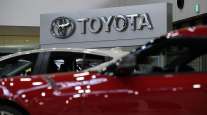Senior Reporter
Economic Concern Spreads in US Along With Coronavirus

[Stay on top of transportation news: Get TTNews in your inbox.]
Alarm bells are ringing about the state of the U.S. economy amid growing fears over the spread of the deadly coronavirus while the government and medical community work toward a vaccine.
The contagion has infected around 600 in the United States and dozens are dead.
Fear caused a meltdown in the financial and oil markets March 9, when the Dow Jones Industrial Average plummeted 2,013 points, or 7.8%, to 23,851.02 and crude tumbled below $35 per barrel.
READ MORE: Global Markets Pick Up After Plunge on Coronavirus, Oil
The virus first showed up in China, shuttering some manufacturing plants and significantly slowing production of goods such as electronics, textiles and toys slated for delivery across the U.S. market by truck.
“The disruptions in China and the disruptions to the supply chain are working their way through finally to the store shelves,” said Paul Bingham, a transportation economist with IHS Markit.
But the first economic challenge is at U.S. ports.
Port officials in Los Angeles and Long Beach, Calif., said about half of the cargo they import originates in China, and that 41 ships have canceled deliveries between mid-February and into early April.
Eugene Seroka, executive director at the Port of Los Angeles, recently said cargo business in February could be down 25% compared with 2019, and is expected to drop 15% to 17% for the quarter.
Los Angeles is the nation’s largest port, followed by Long Beach.
Further, coronavirus has become hazardous to those working at seaports.

Cotton
Rick Cotton, executive director of the third-largest port operator, the Port Authority of New York and New Jersey, tested positive for coronavirus and is quarantined at home, New York Gov. Andrew Cuomo announced March 9.
The American Association of Port Authorities said the next several weeks would be challenging even as manufacturing in China starts to get back to normal.
“It’ll take weeks to clear cargo backlogs,” AAPA said.
The Federal Reserve’s latest nationwide survey, released March 4, showed Mid-Atlantic ports with strong volume growth.
Read about economic conditions in Reserve Bank Districts in the #BeigeBook: https://t.co/8OYYEvlcJX pic.twitter.com/Yguo7qdHQK — Federal Reserve (@federalreserve) March 4, 2020
Meanwhile, the Department of Labor said the economy added 273,000 jobs and the national unemployment rate fell to 3.5%, matching its lowest level in more than 50 years.
Bob Costello, chief economist at American Trucking Associations, said the employment picture for the transportation industry was mixed, however.
“Employment for the transportation industry, excluding warehousing, contracted nearly 9,300 in February. Conversely, for-hire trucking employment rose 1,700,” Costello said.
He said as of now, the effect of coronavirus to the economy overall is unsettled.
“While we simply don’t know the real impact, it is likely that our baseline forecasts, at least for the near term, will be lowered. Still no immediate sign of a recession, but instead, we could see GDP of sub-2% rather than at or slightly above 2%,” Costello said.
Host Seth Clevenger went to CES 2020 to look at the road ahead for electric-powered commercial vehicles. He spoke with Scott Newhouse of Peterbilt and Chris Nordh of Ryder System. Hear a snippet, above, and get the full program by going to RoadSigns.TTNews.com.
University of Minnesota-Morris economics professor Stephen Burks, a former truck driver now specializing in trucking supply chain issues, agrees there isn’t enough information to accurately project where the economy will be in two to three months.
“The evidence seems to be accumulating; there will be a measurable impact, but how big that impact will be, that’s the question,” he said.
Several organizations, including the International Monetary Fund, have downgraded China’s second-quarter economic growth. IMF said the 2020 growth forecast would be 5.6%, a decrease of 0.4% and the lowest level of growth since 1990.
ACT Research President Kenny Vieth said the impact of China’s slowing economy would be a blow to the U.S. economy.
“The Chinese response to the coronavirus is going to cause the U.S. manufacturing sector and U.S. housing sector to feel supply chain pressures in the second quarter,” he said. “People are choosing not to fly, people not going on vacations. That has an impact on consumer spending. It is slowing down activity.”
Vieth believes the U.S. economy will turn negative in the second quarter but rebound later in the year.
Want more news? Listen to today's daily briefing:





